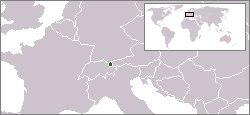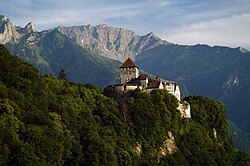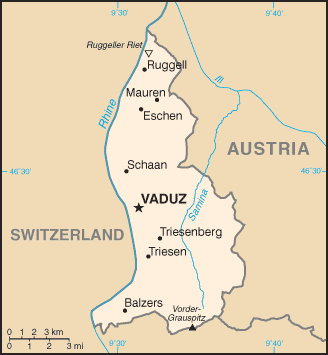This is an old revision of this page, as edited by 141.161.70.77 (talk) at 03:09, 10 May 2005 (→History). The present address (URL) is a permanent link to this revision, which may differ significantly from the current revision.
Revision as of 03:09, 10 May 2005 by 141.161.70.77 (talk) (→History)(diff) ← Previous revision | Latest revision (diff) | Newer revision → (diff)The Principality of Liechtenstein (German: Fürstentum Liechtenstein) is a tiny, landlocked country in Western Europe, bordered by Switzerland to its west and by Austria to its east. Mountainous, it is a winter sports resort, and is perhaps best-known as a tax haven. It is also the only German speaking country which does not share a border with Germany.
| |||||
| National motto: None | |||||

| |||||
| Official language | German | ||||
| Capital | Vaduz | ||||
| Largest city | Schaan | ||||
| Head of State | Hans-Adam II | ||||
| Regent | Alois | ||||
| Head of Government | Otmar Hasler | ||||
| Area - Total - % water |
Ranked 189th 160 km² Negligible | ||||
| Population - Total (2004) - Density |
Ranked 187th 32,528 203/km² | ||||
| Independence | 1806 | ||||
| Currency | Swiss Franc (CHF) | ||||
| Time zone - in summer |
CET (UTC+1) CEST (UTC+2) | ||||
| National anthem | Oben am jungen Rhein | ||||
| Internet TLD | .li | ||||
| Calling Code | +423 | ||||
History
Main article: History of Liechtenstein
The modern territory of Liechtenstein formed at one time (an albeit diminuitive) part of the ancient Roman province of Raetia. For centuries this territory, geographically removed from European strategic interests, had little impact on the tide of European history. Prior to the reign of its current dynasty, the region was enfiefed to a junior line of the House of Habsburg.
The Liechtenstein dynasty, from which the Principality takes its name (rather than vice-versa), takes its name from Castle Liechtenstein in faraway Lower Austria, which the family posessed from at least 1140 to the 13th century, and from 1807 onwards. Through the centuries, the dynasty acquired vast swathes of land, predominantly in Moravia, Lower Austria and Styria, though in all cases, these territories were held in fief under other more senior feudal lords, particularly under various lines of the Habsburg family, which several of Liechtenstein princes served as close advisors. Thus, and without any territory held directly under the Imperial throne, the Liechtenstein dynasty was unable to meet a primary requirement to qualify for a seat in the Imperial diet, the Reichstag.
The family yearned for the added power which a seat in the Imperial government would garner, and therefore searched for lands to acquire which would be "unmittelbar" or held without any feudal personage other than the Emperor himself having rights on the land. After some time, the family was able to arrange the purchase of the minuscule counties of Schellenberg and Vaduz (in 1699 and 1712 respectively) from an agnatic line of the Habsburg dynasty. Tiny Schellenberg and Vaduz possessed exactly the political status required, no feudal lord other than their comital sovereign and the suzerain Emperor.
Thereby, on January 23, 1719, after purchase had been duly made, Emperor Charles VI decreed the counties of Vaduz and Schellenberg raised to the dignity of principality with the name "Liechtenstein" in honor of 'true servant, Anton Florian of Liechtenstein'. It is on this date that Liechtenstein became a sovereign state of the Holy Roman Empire. Ironically, but as testament to the pure political expediency of the purchases, the Princes of Liechtenstein did not set foot in their new principality for several decades.

In 1806, the Holy Roman Empire was invaded by France. This event had broad consequences for Liechtenstein: Imperial legal and political mechanisms broke down, while the Holy Roman Emperor abdicated the imperial throne. The Empire itself dissolved. As a result, Liechtenstein ceased to have any obligations to any feudal lord beyond its borders. Modern publications generally (although incorrectly) attribute Liechtenstein's 'sovereignty' to these events. In reality, its prince merely became suzerain as well as remaining sovereign lord.
Until the end of World War I, Liechtenstein was closely tied to Austria. However, the economic devastation caused by that conflict forced the country to conclude a customs and monetary union with its other neighbor, Switzerland. During World War II, Liechtenstein remained neutral, while family treasures within the war zone were brought to Liechtenstein (and London) for safe keeping. At the close of the conflict, Czechoslovakia and Poland, acting to seize "German" possessions, expropriated the entirety of the Liechtenstein dynasty's hereditary lands and possessions in Bohemia, Moravia and Silesia - the Princes of Liechtenstein lived in Vienna until 1938. The expropriations (subject to modern legal dispute at the World Court) included over 1,600 km² of agricultural and forest land, including also several family castles and palaces. It is thus little wonder that during the decades of the Cold War, citizens of Liechtenstein were forbidden by Czechoslovakia from even entering that country.
In financial straits following the war, the Liechtenstein dynasty often resorted to selling family artistic treasures, including for instance Da Vinci's priceless portrait "Ginevra de Benci", which was purchased by the United States government. However, the economic condition of Liechtenstein improved rapidly. During the decades following, Liechtenstein prospered, its economy modernizing with the advantage of low corporate tax rates which drew many companies to the country.
The Prince of Liechtenstein is among the world's wealthiest heads-of-state, with an estimated wealth of 2 billion dollars. The country's population enjoys one of the world's highest standards of living.
Politics
Main article: Politics of Liechtenstein
Liechtenstein is a parliamentary democracy headed by its ruling prince or Fürst. The current prince is Hans-Adam II of Liechtenstein, who succeeded upon his father's death in 1989. The parliament of Liechtenstein, the Landtag, consists of 25 representatives chosen by the people. A cabinet of five members is responsible for daily political matters.
In a referendum on July 1, 1984, male voters granted women the right to vote in national (though not local) elections, a victory for Prince Hans-Adam who had supported the legislation. Unlike many other constitutional monarchies, the constitution of Liechtenstein gives many important powers to the Prince, some of which have caused controversy in recent years.
Critics were however, largely discredited when in March 2003, a popular referendum bolstered the Liechtenstein dynasty's constitutional position. Prior to the referendum, Prince Hans-Adam had announced that he and his family would relocate to Vienna, Austria were the House's constitutional prerogatives curbed. The referendum confirmed the broad popularity of the Liechtenstein dynasty and underscored the populace's faith in Prince Hans-Adam as leader. The Council of Europe took no action.
The parliamentary elections of March 11 and 13th, 2005 resulted in the government of Otmar Hasler losing its general majority in the Landtag.
Communities
Main article: Communities of Liechtenstein
Liechtenstein is divided among eleven communities (Gemeinden - singular Gemeinde), most consisting of only a single town. These are:

Geography

Main article: Geography of Liechtenstein
Liechtenstein is situated in the Upper Rhine valley of the European Alps. The entire western border of Liechtenstein is formed by the river. In its east, Liechtenstein rises to higher altitudes, its highest point, the Grauspitz, reaches 2,599 m (8,527 ft.). Despite its alpine location, prevailing southerly winds make the climate of Liechtenstein rather mild. In winter, the mountain slopes are well suited to winter sports.
Liechtenstein is one of only two doubly landlocked countries in the world, i.e. a country surrounded by other landlocked countries. (The other example is Uzbekistan).
Economy
Main article: Economy of Liechtenstein
Despite its small geographic area and limited natural resources, Liechtenstein has developed into a prosperous, highly industrialised, free-enterprise economy, and boasts a financial service sector and also living standard which compare favorably to those of the urban areas of Liechtenstein's large European neighbours. Advantageously low business taxes – the maximum tax rate is 18% – as well as easy Rules of Incorporation have induced about 73,700 holding (or so-called 'letter box' companies) to establish nominal offices in Liechtenstein. Such processes provide about 30% of Liechtenstein's state revenue.
Recently, Liechtenstein has shown strong determination to dispel the country's unhelpful image as a center of international money-laundering.
Liechtenstein participates in a customs union with Switzerland and employs the Swiss franc as national currency. The country imports more than 90% of its energy requirements. Liechtenstein has been a member of the European Economic Area (an organization serving as a bridge between the European Free Trade Association (EFTA) and the European Union) since May 1995. The government is working to harmonize its economic policies with those of an integrated Europe. Since 2002, Liechtenstein's rate of unemployment has doubled, although it stood at only 2.2% in the third quarter of 2004. This represents the lowest unemployment rate in the European Economic Area.
Demographics
Main article: Demographics of Liechtenstein
Liechtenstein is the fourth smallest country of Europe, after Vatican City, Monaco, and San Marino. Its resident population is approximately 1/3 foreign-born, primarily Germans, Austrians, and Swiss.
The official language is German, though most speak an Alemannic dialect of German, see Middle High German. About 76% of the population adhere to the Roman Catholic faith, about 7% are Protestant.
Transport
There are about 250 km of paved roadway within Liechtenstein, and 9.5 km of railway. The country's rails are administered by the Austrian Federal Railways as part of the route between Feldkirch, Austria, and Buchs SG, Switzerland. Four stations in Liechtenstein, including Schaan-Vaduz, Forst Hilti, Nendeln, and Schaanwald, are served by an irregular stopping-train service running between Feldkirch and Buchs. EuroCity while other long distance international trains also make use of the route, these, however, do not call at Liechtenstein stations. Liechtenstein Bus is a subsidiary of the Swiss Postbus system, and connects to the Swiss bus network at Buchs SG and at Sargans.
Sport
Liechtenstein football teams play in the Swiss football leagues. The Liechtenstein Cup allows access to one Liechtenstein team each year in the UEFA Cup -- FC Vaduz, a team playing in the Swiss Challenge League (i.e. the second level of Swiss football) is the most successful team in the Cup, and scored their greatest success in the European Cup Winners' Cup in 1996 when they defeated the Latvian team FC Universitate Riga by 1:1 and 4:2, to go on to a lucrative fixture against Paris St Germain, which they lost 0:4 and 0:3.
The Liechtenstein national football team has traditionally been regarded as an easy target for any team drawn against them. In autumn 2004, however, in an astonishing week the team reached a 2:2 draw with Portugal, which had only a few months earlier been the losing finalists in the European Championships, and went on four days later to defeat Luxembourg by 4 goals to 0 in Luxembourg, in qualification matches for the 2006 World Cup.
As an alpine country, the main opportunity for Liechtensteiners to excel is in winter sports such as downhill skiing: Hanni Wenzel won two Olympic titles in 1980.
External links
- Principality of Liechtenstein - Official State site
- Liechtenstein.Allhere - Portal containing links to Liechtenstein related sites
- Liechtenstein Paper Money - 1920 Heller Issues